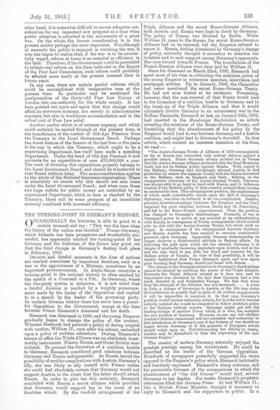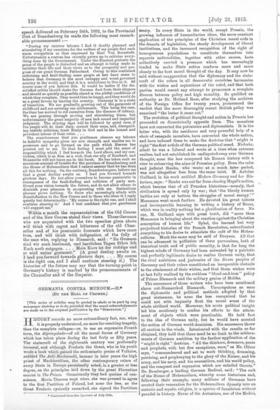THE TURNING-POINT IN GERMANY'S HISTORY.
OCCASIONALLY the historian is able to point to a certain moment and say : " This was the time when the future of the nation was decided." Prusso-Germany, which hitherto has been prosperous and wonderfully suc- cessful, has apparently reached the turning-point of her fortunes, and the historian of the future may point out that the fatal change in Germany's destiny took place in February, 1892. Decisive and fateful moments in the lives of nations are marked sometimes by important decisions, such as war or the appointment of a. Minister, sometimes by an important pronouncement. In Anglo-Saxon countries a turning-point in the national history is often marked by the speech of a Cromwell or a Pitt. In Germany, where the two-party system is unknown, it is not usual that a fateful decision is marked by a weighty pronounce- ment made by the leader of the Opposition and replied to in a speech by the leader of the governing party. In modern German history there has never been a power- ful Opposition to the Government, except at the time between Prince Bismarck's dismissal and his death.
Bismarck was dismissed in1890, and the young Emperor gradually began to change the policy of the country. Whereas Bismarck had pursued a policy of daring coupled 'with caution, William II., soon after his advent, embarked upon a policy of reckless adventure. During Bismarek'a tenure of office the Triple Alliance was an absolutely trust- worthy instrument. France, Russia, and Great Britain were isolated. To prevent the formation of a coalition hostile to Germany, Bismarck considered good relations between Germany and Russia indispensable. As Russia feared the possibility of warlike complications with Austria, Germany's ally, she was likely to ally herself with France unless she could feel absolutely certain that Germany would not support Austria in the event that the latter should attack 'Russia. In order to give her this certainty, Bismarck concluded with Russia a secret alliance which provided that Germany would support her in the event of an Austrian attack. By the twofold arrangement of the Triple Alliance and the secret Russo-German Alliance, both Austria and Russia, were kept in check by German,y. The policy of Vienna was directed by Berlin. When William II. came to the throne, the secret Russo-German Alliance had to be renewed, but the Emperor refused to renew it. Russia, feeling threatened by Germany's change of policy, naturally thought it necessary to abandon her isolation and to seek support among Germany's opponents. Her eyes turned towards France. The foundations of the Franco-Russian Alliance were thus laid by William II. Since his dismissal, on March 22nd, 1890, Bismarck had spent most of his time in criticizing the mistaken policy of the young Emperor in numerous speeches, interviews, and newspaper articles. Up to January, 1892, the Chancellor had never mentioned the secret Russo-German Treaty. He had not even hinted at its existence. Foreseeing, however, that the non-renewal of that Treaty would load to the formation of a coalition hostile to Germany and to the break-up of the 'Triple Alliance, and that it would ultimately involve Germany in an unnecessary war in the Balkan Peninsula, Bismarck at last, on January 24th,1892, had inserted in the Hamburger Naehriclaten an article revealing the existence of the Russo-German Treaty, and foretelling that the abandonment of his policy • by time Emperor would lead to war between Germany and a hostile coalition, and might lead to Germany's downfall. In that article, which created an immense sensation at the time, we read :—
"The Austro-German Treaty of Alliance of 1879 contemplated, as far as Russia was concerned, only mutual defence against a possible attack. Hence Germany always pointed out in Vienna that the Austro-German Alliance protected only the Dual Monarchy itself, but not its Balkan policy, against Russia. With regard to the Balkans, Germany had unceasingly advised Austria to find protection by means of a separate Treaty with the States interested in the Balkans, suoh as England and Italy. Relying on the unaggressive character of the Austro-German Treaty, Germany was always able to go hand in hand with Russia, and to influence Austria if the Eastern policy of that country seemed likely to take an undesirable turn. This advantageous position, the maintenance of which made considerable claims upon the skill of Germany's diplomacy, was later on believed to be too complicated. Besides, personal misunderstandings [between the Emperor and the Tsar] impaired the good relations between Berlin and St. Petersburg, and led to the Russo-French rapprochement. Thus the position has changed to Germany's disadvantage. Formerly, it was in Germany's power to arrive at any moment at an understanding with Russia, in consequence of Treaty arrangements which existed side by side with the Austro-German Treaty, but which exist no longer. In consequence of the estrangement between Germany and Russia, Austria has been enabled to exercise considerable pressure upon Germany. Apparently German statesmanship no longer observes a disinterested attitude in Eastern affairs. By following the path upon which she has entered, Germany is in danger of gradually becoming dependent upon Austria, and in the end she may have to pay with her blood and treasure for the Balkan policy •of Vienna. In view of that possibility, it will be readily understood that Prince Bismarck again and ever again gave warning that Germany, should not break with Russia. . .
The change in the European situation to Germany's disadvantage cannot be excused by extolling the power of the Triple Alliance. Formerly the Triple, Alliance existed 'as it does now, and its importance was increased by the fact that Germany had a free hand, directed it, and dominated Europe. We fear that since then the strength of the Alliance has not increased. . . . A crisis in Italy, e. change of Sovereign in Austria or the like may shake its foundations so greatly that in spite of all written engagements it will be impossible to maintain it. In that case, Germany's position would become extremely serious, for in order not to become entirely isolated she would be compelled to follow Austria's policy in the Balkans without reserve. Germany might get into the leading-strings of another Power which, it is true, has accepted the new position of Germany. However, no one can tell whether Austria's historic resentment will not reawaken and endeavour to find satisfaction at Germany's cost if the fortune of war should no longer favour Germany or if the pressure of European events should weigh upon us. Notwithstanding her fidelity to treaty, Austria may be disinclined to bear the supremacy of the new German Empire."
The creator of modern Germany naturally enjoyed the . . greatest prestige among his countrymen. He could be described as the leader of the German Opposition. Hundreds of newspapers powerfully supported the views opposed to the Emperor's policy which Bismarck habitually and fearlessly expressed. Bismarck's sharp criticism, and his pessimistic forecast of the consequences to which the abandonment of " the Old Course would lead, stirred Germany to her depths. For weeks Bismarck's prophetic utterances filled the German Press. At last William It., like a British Prime Minister, thought it 'necessary to reply to -Bismarck and his supporters in public. In a
speech delivered on February 24th, 1892, to the Provincial Diet of Brandenburg he made the following most remark- able pronouncement
"During my onerous labours I find it doubly pleasant and stimulating if my exertions for the welfare of my people find such warm recognition as that expressed by Herr 'Von Bornstedt. Unfortunately a custom has recently grown up to criticize every- thing done by the Government. Under the flimsiest pretexts the peace of the people is disturbed and an attempt is being made to embitter their life and their views as to the prosperity and pro- gress' of our great German Fatherland. Owing to this continued criticizing and fault-finding some people at last have come to believe that Germany is the moat unhappy and worst governed country in the world, and that it is a misfortune to live in it. Of course none of you believe this. It would be better if the dis- satisfied critics should shako the German dust from their slippers and should as quickly as possible abandc n the pitiful conditions of which they complain. They would then be happy, and they would do us a great favour by leaving the country. Germany is in a state of transition. We are gradually growing out of the garments of childhood and are entering our adolescence. This being the ease, the time has arrived to rid ourselves from the diseases of infancy. We are passing through moving and stimulating times, but unfortunately the great majority of men lack sound and impartial judgment. The stirring days will be followed by quiet ones, if the people will do their duty, correct their ways, and, disregard- ing outside criticism, trust firmly in God and in the honest and provident labour of their ruler. . . . The consciousness that you gentlemen observe my labours in faithful sympathy gives me new strength and enables me to persevere and to go forward on the path which Heaven has pointed out to me. To that feeling I must add the sense of responsibility which I feel towards, the Lord above, and my con- viction, which is as firm as a rock, that our ally of Beasbach and Dcnnewitz will not leave me in the lurch. He has taken such an enormous amount of trouble for the province of Brandenburg and the House of Hohenzollern that I cannot assume that he has done all this for nothing. On the contrary, Brandenburgers, believe me that a great destiny awaits us. I lead you forward towards glorious days. Do not allow yourselves to become pessimistic in consequence of the fault-finding and criticism of party mon. Direct your vision towards the future, and do not allow others to diminish your pleasure in co-operating with me. Sententious phrases prove nothing. To those who unceasingly allude with dissatisfaction to the New Course and to those who steer it I reply quietly but determinedly : 'My course is the right one, and I shall continue steering it. And I feel confident that you gentlemen RV' support me."
Within a month the representatives of the Old Course and of the New Course stated their views. Those Germans who are acquainted with the two speeches given above will think with regret and bitterness of the old Chan- cellor and of his pessimistic forecasts which have come true, and will think with indignation of the folly of the man who, replying to Bismarck, said : " Zu Grosaem sin(' wir noch bestimmt, und herrlichen Tagen fiihre Ich Euch noch entgegen. . . . Mein Kura ist der richtige und er wird welter gesteuert." (A great destiny awaits us. I lead you forward towards glorious days. . . . My course is the right one, and I shall continue steering it.) The historian of the future may say that the turning-point in Germany's history is marked by the pronouncements of the Chancellor and of the Emperor.



































 Previous page
Previous page